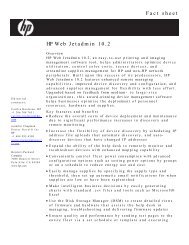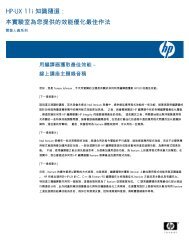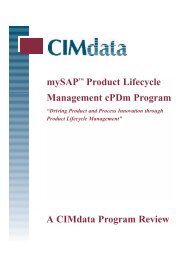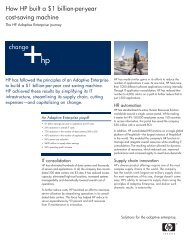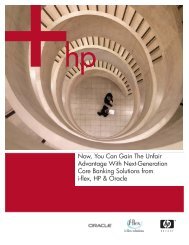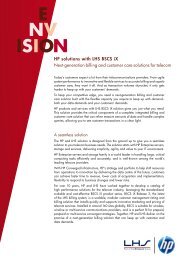HP-UX 11i Knowledge-on-Demand
HP-UX 11i Knowledge-on-Demand
HP-UX 11i Knowledge-on-Demand
Create successful ePaper yourself
Turn your PDF publications into a flip-book with our unique Google optimized e-Paper software.
<str<strong>on</strong>g>HP</str<strong>on</strong>g>-<str<strong>on</strong>g>UX</str<strong>on</strong>g> <str<strong>on</strong>g>11i</str<strong>on</strong>g> <str<strong>on</strong>g>Knowledge</str<strong>on</strong>g>-<strong>on</strong>-<strong>Demand</strong><br />
<str<strong>on</strong>g>HP</str<strong>on</strong>g> technical Webcast series: software optimizati<strong>on</strong><br />
© 2007 Hewlett-Packard Development Company, L.P. The informati<strong>on</strong> c<strong>on</strong>tained herein is subject to change without notice<br />
Technology for better business outcomes
<str<strong>on</strong>g>HP</str<strong>on</strong>g>-<str<strong>on</strong>g>UX</str<strong>on</strong>g> <str<strong>on</strong>g>11i</str<strong>on</strong>g> v3 <str<strong>on</strong>g>Knowledge</str<strong>on</strong>g>-<strong>on</strong>-<strong>Demand</strong><br />
• Objective: Support software development partners<br />
and customers in achieving better business<br />
outcomes with <str<strong>on</strong>g>HP</str<strong>on</strong>g>-<str<strong>on</strong>g>UX</str<strong>on</strong>g> <str<strong>on</strong>g>11i</str<strong>on</strong>g>.<br />
• What <str<strong>on</strong>g>HP</str<strong>on</strong>g> is providing: a series of technical <strong>on</strong>demand<br />
training Webcasts<br />
− Focused <strong>on</strong> helping developers increase performance<br />
through applicati<strong>on</strong> optimizati<strong>on</strong> for <str<strong>on</strong>g>HP</str<strong>on</strong>g>-<str<strong>on</strong>g>UX</str<strong>on</strong>g> <str<strong>on</strong>g>11i</str<strong>on</strong>g> v3 <strong>on</strong><br />
<str<strong>on</strong>g>HP</str<strong>on</strong>g> Integrity servers<br />
− Access to <str<strong>on</strong>g>HP</str<strong>on</strong>g> for follow-up questi<strong>on</strong>s<br />
− Available at www.hp.com/go/knowledge<strong>on</strong>demand<br />
<str<strong>on</strong>g>HP</str<strong>on</strong>g>-<str<strong>on</strong>g>UX</str<strong>on</strong>g> <str<strong>on</strong>g>11i</str<strong>on</strong>g> v3 Training
<str<strong>on</strong>g>HP</str<strong>on</strong>g>-<str<strong>on</strong>g>UX</str<strong>on</strong>g> <str<strong>on</strong>g>11i</str<strong>on</strong>g> v3 <str<strong>on</strong>g>Knowledge</str<strong>on</strong>g>-<strong>on</strong>-<strong>Demand</strong><br />
Webinars – planned curriculum<br />
• Foundati<strong>on</strong> Track<br />
− Module 1: How to upgrade to <str<strong>on</strong>g>HP</str<strong>on</strong>g>-<str<strong>on</strong>g>UX</str<strong>on</strong>g> <str<strong>on</strong>g>11i</str<strong>on</strong>g> v3<br />
− Module 2: <str<strong>on</strong>g>HP</str<strong>on</strong>g>-<str<strong>on</strong>g>UX</str<strong>on</strong>g> open source resources<br />
− Module 3: Unified file cache<br />
− Module 4: Caliper<br />
− Module 5: NUMA Tuning: Getting the Most Out of Your Cellular Server by using NUMA<br />
− Module 6: The Mercury Library – Increasing Applicati<strong>on</strong> Performance<br />
− Module 7: Software Transiti<strong>on</strong> Kit's (STK's) for <str<strong>on</strong>g>HP</str<strong>on</strong>g>-<str<strong>on</strong>g>UX</str<strong>on</strong>g> <str<strong>on</strong>g>11i</str<strong>on</strong>g> v3<br />
• Java Developers Track<br />
− Module 8: Java Memory Management - Internals and Performance<br />
− Module 9: <str<strong>on</strong>g>HP</str<strong>on</strong>g>jmeter – measure Java applicati<strong>on</strong> performance <strong>on</strong> <str<strong>on</strong>g>HP</str<strong>on</strong>g>-<str<strong>on</strong>g>UX</str<strong>on</strong>g> <str<strong>on</strong>g>11i</str<strong>on</strong>g><br />
− Module 10: Solving Java performance problems<br />
• C/C++ Developers Track<br />
Additi<strong>on</strong>al Webinars<br />
published going forward!<br />
− Module 11: pthreads enhancements in <str<strong>on</strong>g>HP</str<strong>on</strong>g>-<str<strong>on</strong>g>UX</str<strong>on</strong>g> <str<strong>on</strong>g>11i</str<strong>on</strong>g> v3<br />
− Module 12: Kernel tracing & profiling tools (internal tools)<br />
− Module 13: Using compilers to get optimal performance<br />
− Module 14: <str<strong>on</strong>g>HP</str<strong>on</strong>g> Code Advisor: A Powerful New C/C++ Analysis Tool for <str<strong>on</strong>g>HP</str<strong>on</strong>g>-<str<strong>on</strong>g>UX</str<strong>on</strong>g><br />
− Module 15: M<strong>on</strong>tecito Hyper-Threading <strong>on</strong> <str<strong>on</strong>g>HP</str<strong>on</strong>g>-<str<strong>on</strong>g>UX</str<strong>on</strong>g> <str<strong>on</strong>g>11i</str<strong>on</strong>g> v3<br />
<str<strong>on</strong>g>HP</str<strong>on</strong>g>-<str<strong>on</strong>g>UX</str<strong>on</strong>g> <str<strong>on</strong>g>11i</str<strong>on</strong>g> v3 Training
Related <str<strong>on</strong>g>HP</str<strong>on</strong>g>-<str<strong>on</strong>g>UX</str<strong>on</strong>g> <str<strong>on</strong>g>11i</str<strong>on</strong>g> v3 resources<br />
• All developers’ resources<br />
− <str<strong>on</strong>g>HP</str<strong>on</strong>g>-<str<strong>on</strong>g>UX</str<strong>on</strong>g> <str<strong>on</strong>g>11i</str<strong>on</strong>g> developers’ c<strong>on</strong>tent<br />
www.hp.com/go/hpuxdev<br />
− <str<strong>on</strong>g>HP</str<strong>on</strong>g>-<str<strong>on</strong>g>UX</str<strong>on</strong>g> <str<strong>on</strong>g>11i</str<strong>on</strong>g> v3 news, functi<strong>on</strong>ality, product download and services<br />
resources<br />
www.hp.com/go/hpux<str<strong>on</strong>g>11i</str<strong>on</strong>g><br />
− <str<strong>on</strong>g>HP</str<strong>on</strong>g> Integrity server ISV resources for DSPP members<br />
www.hp.com/go/dspp_integrity<br />
− <str<strong>on</strong>g>HP</str<strong>on</strong>g> Integrity server product informati<strong>on</strong><br />
www.hp.com/go/integrity<br />
• Software partner promoti<strong>on</strong>al opportunity<br />
− <str<strong>on</strong>g>HP</str<strong>on</strong>g> promoti<strong>on</strong> for <str<strong>on</strong>g>HP</str<strong>on</strong>g>-<str<strong>on</strong>g>UX</str<strong>on</strong>g> <str<strong>on</strong>g>11i</str<strong>on</strong>g> v3-ready software partner applicati<strong>on</strong><br />
www.hp.com/go/v3promoti<strong>on</strong><br />
<str<strong>on</strong>g>HP</str<strong>on</strong>g>-<str<strong>on</strong>g>UX</str<strong>on</strong>g> <str<strong>on</strong>g>11i</str<strong>on</strong>g> v3 Training
Enjoy this <str<strong>on</strong>g>Knowledge</str<strong>on</strong>g>-<strong>on</strong>-<strong>Demand</strong> topic!<br />
Thank you for taking time to learn about <str<strong>on</strong>g>HP</str<strong>on</strong>g>-<str<strong>on</strong>g>UX</str<strong>on</strong>g> <str<strong>on</strong>g>11i</str<strong>on</strong>g> v3 and<br />
related technologies.<br />
Please send comments <strong>on</strong> today’s topic and/or requests for<br />
future topics to:<br />
hpuxquesti<strong>on</strong>s@hp.com<br />
<str<strong>on</strong>g>HP</str<strong>on</strong>g>-<str<strong>on</strong>g>UX</str<strong>on</strong>g> <str<strong>on</strong>g>11i</str<strong>on</strong>g> v3 Training
The Mercury Library:<br />
Increasing applicati<strong>on</strong> performance<br />
An <str<strong>on</strong>g>HP</str<strong>on</strong>g>-<str<strong>on</strong>g>UX</str<strong>on</strong>g> <str<strong>on</strong>g>11i</str<strong>on</strong>g> <str<strong>on</strong>g>Knowledge</str<strong>on</strong>g>-<strong>on</strong>-<strong>Demand</strong> software optimizati<strong>on</strong> Webcast<br />
© 2007 Hewlett-Packard Development Company, L.P. The informati<strong>on</strong> c<strong>on</strong>tained herein is subject to change without notice<br />
Technology for better business outcomes
Introducing today’s speaker<br />
Douglas Lars<strong>on</strong> has been a technical leader in<br />
the <str<strong>on</strong>g>HP</str<strong>on</strong>g>-<str<strong>on</strong>g>UX</str<strong>on</strong>g> kernel lab and benchmarking<br />
organizati<strong>on</strong> for over 15 years. Previously to that<br />
he worked in the <str<strong>on</strong>g>HP</str<strong>on</strong>g>-<str<strong>on</strong>g>UX</str<strong>on</strong>g> kernel lab <strong>on</strong> process<br />
management, virtual memory management, and<br />
other areas for almost 10 years. He is also<br />
c<strong>on</strong>sidered <strong>on</strong>e of the lab’s leading experts <strong>on</strong><br />
multiprocessor software performance, locking,<br />
and locking c<strong>on</strong>tenti<strong>on</strong> in particular.<br />
He developed some of the most widely used<br />
internal <str<strong>on</strong>g>HP</str<strong>on</strong>g>-<str<strong>on</strong>g>UX</str<strong>on</strong>g> performance tools (e.g.<br />
spinwatcher, ktracer, kernel profiling). He works<br />
with internal <str<strong>on</strong>g>HP</str<strong>on</strong>g> organizati<strong>on</strong>s as well as field<br />
organizati<strong>on</strong>s and customers to improve <str<strong>on</strong>g>HP</str<strong>on</strong>g>-<str<strong>on</strong>g>UX</str<strong>on</strong>g><br />
and customer performance.<br />
Doug holds two computer-performance related<br />
patents.<br />
<str<strong>on</strong>g>HP</str<strong>on</strong>g>-<str<strong>on</strong>g>UX</str<strong>on</strong>g> <str<strong>on</strong>g>11i</str<strong>on</strong>g> v3 Training
Agenda<br />
• Mercury rati<strong>on</strong>ale<br />
• Mercury overview<br />
• Mercury private functi<strong>on</strong>s<br />
• Mercury public thread informati<strong>on</strong><br />
• Mercury caveats<br />
• How fast is Mercury?<br />
• Summary<br />
<str<strong>on</strong>g>HP</str<strong>on</strong>g>-<str<strong>on</strong>g>UX</str<strong>on</strong>g> <str<strong>on</strong>g>11i</str<strong>on</strong>g> v3 Training
Introducti<strong>on</strong>: Mercury rati<strong>on</strong>ale<br />
• Customer and field reports of certain heavily used areas of functi<strong>on</strong>ality<br />
− Tracking time<br />
− User space locking c<strong>on</strong>tenti<strong>on</strong> issues<br />
− Both too expensive in terms of CPU time<br />
• System call overhead is <strong>on</strong>e key problem here.<br />
− Calls are d<strong>on</strong>e many, many times.<br />
− Calls are d<strong>on</strong>e in performance-critical parts of the code.<br />
• Soluti<strong>on</strong>: Let almost all the work be d<strong>on</strong>e in user space.<br />
• Another key problem is user space lock c<strong>on</strong>tenti<strong>on</strong> when many threads are sharing locks<br />
and resources.<br />
− Threads waiting for locks spin when the lock holder is not running—wasteful.<br />
− Threads holding locks/resources are c<strong>on</strong>text-switched out by the kernel, causing waiting threads<br />
to have to wait even more—<strong>on</strong>ce again, wasteful.<br />
• Soluti<strong>on</strong>:<br />
− Let threads see the run-state of other threads.<br />
− Let threads in critical secti<strong>on</strong>s prevent themselves from being switched out.<br />
<str<strong>on</strong>g>HP</str<strong>on</strong>g>-<str<strong>on</strong>g>UX</str<strong>on</strong>g> <str<strong>on</strong>g>11i</str<strong>on</strong>g> v3 Training
The Mercury name<br />
• “Mercury” was chosen as a name independent of<br />
any other use within <str<strong>on</strong>g>HP</str<strong>on</strong>g>.<br />
− Mercury was the god of speed in Roman mythology. In<br />
particular, he was the messenger of the gods.<br />
− Mercury is an element (also called “quicksilver”), given<br />
the chemical symbol “Hg.” All Mercury functi<strong>on</strong> names<br />
begin with the prefix “hg_”.<br />
<str<strong>on</strong>g>HP</str<strong>on</strong>g>-<str<strong>on</strong>g>UX</str<strong>on</strong>g> <str<strong>on</strong>g>11i</str<strong>on</strong>g> v3 Training
Mercury overview: general<br />
• Mercury c<strong>on</strong>sists of an <str<strong>on</strong>g>HP</str<strong>on</strong>g>-<str<strong>on</strong>g>UX</str<strong>on</strong>g> kernel part and a<br />
library part.<br />
− The kernel part is fully implemented in <str<strong>on</strong>g>HP</str<strong>on</strong>g>-<str<strong>on</strong>g>UX</str<strong>on</strong>g> <str<strong>on</strong>g>11i</str<strong>on</strong>g> v3<br />
(11.31).<br />
− The library part is also implemented in the same release.<br />
The library can be compiled into a C program by using<br />
the “-lhg” opti<strong>on</strong>.<br />
− The interface c<strong>on</strong>sists of a set of about 16 functi<strong>on</strong> calls<br />
that are accessible from user programs.<br />
− Mercury has a manual page—just type in “man<br />
mercury” <strong>on</strong> your <str<strong>on</strong>g>11i</str<strong>on</strong>g> v3 system.<br />
<str<strong>on</strong>g>HP</str<strong>on</strong>g>-<str<strong>on</strong>g>UX</str<strong>on</strong>g> <str<strong>on</strong>g>11i</str<strong>on</strong>g> v3 Training
Mercury overview: private functi<strong>on</strong>s<br />
• Mercury thread-private functi<strong>on</strong>s<br />
− Have a per-thread memory area that the kernel knows<br />
about; used by the Mercury library, not directly by user<br />
code<br />
− If changed, the kernel updates when returning to user<br />
space after a system call or after a trap has occurred.<br />
− C<strong>on</strong>sist of various time-related functi<strong>on</strong>s, various c<strong>on</strong>text<br />
switch related functi<strong>on</strong>s (including setting critical<br />
regi<strong>on</strong>s), and getting the CPU number you are running<br />
<strong>on</strong><br />
− Run fast because they are mostly just memory<br />
operati<strong>on</strong>s, not system calls<br />
<str<strong>on</strong>g>HP</str<strong>on</strong>g>-<str<strong>on</strong>g>UX</str<strong>on</strong>g> <str<strong>on</strong>g>11i</str<strong>on</strong>g> v3 Training
Mercury overview: public functi<strong>on</strong>s<br />
Mercury public functi<strong>on</strong>s<br />
• Have a memory regi<strong>on</strong> shared with all threads in the system. This area<br />
is accessed by the Mercury library <strong>on</strong>ly, never directly by the user<br />
code. This regi<strong>on</strong> is read-<strong>on</strong>ly for user threads.<br />
• The kernel updates the informati<strong>on</strong> in this regi<strong>on</strong> as it happens, <strong>on</strong> a<br />
“best effort” basis.<br />
• Only threads that request it will be tracked in this global memory<br />
regi<strong>on</strong>.<br />
• Allow <strong>on</strong>e thread to see what state other threads are in as well as<br />
allow a thread to become a thread with a viewable state<br />
• Run fast because they are mostly memory operati<strong>on</strong>s, not system calls<br />
• Have as their original purpose promoting the efficient use of shared<br />
resources<br />
<str<strong>on</strong>g>HP</str<strong>on</strong>g>-<str<strong>on</strong>g>UX</str<strong>on</strong>g> <str<strong>on</strong>g>11i</str<strong>on</strong>g> v3 Training
Mercury private: time functi<strong>on</strong>s<br />
• hg_gethrcycles(): time in machine-dependent cycles since<br />
the machine has booted; adjusted to match M<strong>on</strong>arch<br />
• hg_gethrtime(): time in nanosec<strong>on</strong>ds since the machine<br />
booted; adjusted to match M<strong>on</strong>arch; very comparable to<br />
the widely used gethrtime(), <strong>on</strong>ly faster<br />
• hg_nano_to_cycle_ratio(): useful if you wish to record your<br />
raw data in cycles (because hg_gethrcycles is the fastest)<br />
and later c<strong>on</strong>vert them to nanosec<strong>on</strong>ds for output<br />
• hg_busywait(): just spin wait for a fixed amount of real<br />
time; changing processors will not throw this off; a problem<br />
solved compared to spin waiting using the ITC<br />
<str<strong>on</strong>g>HP</str<strong>on</strong>g>-<str<strong>on</strong>g>UX</str<strong>on</strong>g> <str<strong>on</strong>g>11i</str<strong>on</strong>g> v3 Training
Mercury private: c<strong>on</strong>text switch functi<strong>on</strong>s<br />
• hg_c<strong>on</strong>text_switch_involuntary()/hg_c<strong>on</strong>text_switch_voluntary: returns<br />
number of involuntary/voluntary c<strong>on</strong>text switches since the thread<br />
creati<strong>on</strong><br />
• hg_c<strong>on</strong>text_switch_tries(): involuntary + voluntary<br />
• hg_setcrit(): requests the kernel to start (or stop) taking involuntary<br />
c<strong>on</strong>text switches; more <strong>on</strong> hg_setcrit() next page<br />
• A c<strong>on</strong>text switch, in the <str<strong>on</strong>g>HP</str<strong>on</strong>g>-<str<strong>on</strong>g>UX</str<strong>on</strong>g> kernel, occurs when a processor begins<br />
to execute a thread (“switch in”) or when it ceases to execute a thread<br />
(“switch out”).<br />
− A voluntary c<strong>on</strong>text switch occurs when a thread switches out as a result of<br />
acti<strong>on</strong>s it is taking—e.g., reading from a disk, or taking a page fault.<br />
− An involuntary c<strong>on</strong>text switch occurs when a thread is switched out as a<br />
result of kernel policy decisi<strong>on</strong>s—e.g., end of a time slice, or a higherpriority<br />
thread has become runnable.<br />
<str<strong>on</strong>g>HP</str<strong>on</strong>g>-<str<strong>on</strong>g>UX</str<strong>on</strong>g> <str<strong>on</strong>g>11i</str<strong>on</strong>g> v3 Training
Mercury private: hg_setcrit() details<br />
hg_setcrit() can act to prevent the thread from taking<br />
involuntary c<strong>on</strong>text switches.<br />
• Useful for reducing c<strong>on</strong>tenti<strong>on</strong> <strong>on</strong> locks of critical regi<strong>on</strong>s<br />
− This helps solve the problem that if a thread holds a lock while it is switched out and the lock hold time goes up,<br />
causing other threads to have to wait for it. It is better for the lock holder to finish as fast as possible.<br />
• The kernel will usually h<strong>on</strong>or this request, but policy reas<strong>on</strong>s may require the kernel to do a c<strong>on</strong>text<br />
switch anyway. Examples:<br />
− The thread may have held off too many switches; for fairness reas<strong>on</strong>s, the kernel will begin to override the<br />
requests.<br />
− A higher-priority real-time thread may have become runnable. Higher priority time-share threads w<strong>on</strong>’t do this.<br />
• And others …<br />
• I recommend using the following c<strong>on</strong>structi<strong>on</strong> (different from man page):<br />
hg_setcrit( lock_address, UNWILLING_TO_BLOCK)<br />
acquire lock<br />
critical regi<strong>on</strong><br />
release lock<br />
hg_setcrit( CRIT_OFF, UNWILLING_TO_BLOCK )<br />
If your critical regi<strong>on</strong>s are short enough compared to your other code, this will be a win for you relative<br />
to the sequences <strong>on</strong> the man page; you will take enough c<strong>on</strong>text switches elsewhere to keep the kernel<br />
happy, and you w<strong>on</strong>’t have to take extra <strong>on</strong>es here.<br />
<str<strong>on</strong>g>HP</str<strong>on</strong>g>-<str<strong>on</strong>g>UX</str<strong>on</strong>g> <str<strong>on</strong>g>11i</str<strong>on</strong>g> v3 Training
Mercury public: structure<br />
• There is a memory regi<strong>on</strong> shared with all threads in the<br />
system. This area is accessed by the Mercury library <strong>on</strong>ly,<br />
never directly by the user code.<br />
• The kernel updates the informati<strong>on</strong> in this regi<strong>on</strong> as it<br />
happens, <strong>on</strong> a “best effort” basis.<br />
• Only threads that request it will be tracked in this global<br />
memory regi<strong>on</strong>.<br />
• Some Mercury public functi<strong>on</strong>s see what state other threads<br />
are in; others c<strong>on</strong>trol when a thread has its state viewable.<br />
• The functi<strong>on</strong>s run fast because they are mostly memory<br />
operati<strong>on</strong>s, not system calls.<br />
<str<strong>on</strong>g>HP</str<strong>on</strong>g>-<str<strong>on</strong>g>UX</str<strong>on</strong>g> <str<strong>on</strong>g>11i</str<strong>on</strong>g> v3 Training
Mercury public: initializati<strong>on</strong><br />
• hg_public_init(), hg_public_remove(): Allows a thread to<br />
make its state viewable (and get a viewing handle), or turn<br />
off viewability<br />
− Initializing is <strong>on</strong>ly needed if the calling thread needs to have its own<br />
state viewed by other threads. Viewing the state of another thread<br />
<strong>on</strong>ly requires knowing its handle.<br />
− The handle returned by hg_public_init() must be passed to the<br />
threads who wish to view the state. This is the <strong>on</strong>ly source of the<br />
handle. One way to pass this handle is to put it in a shared lock<br />
structure so that the thread waiting can view the handle owner.<br />
− Remember, <strong>on</strong>ce a thread has made its state viewable, any thread<br />
<strong>on</strong> the system may view it. Not knowing the handle is <strong>on</strong>ly a minor<br />
barrier for some<strong>on</strong>e determined to view that state.<br />
<str<strong>on</strong>g>HP</str<strong>on</strong>g>-<str<strong>on</strong>g>UX</str<strong>on</strong>g> <str<strong>on</strong>g>11i</str<strong>on</strong>g> v3 Training
Mercury public: viewing state<br />
• Hg_public_is_reporting(): returns true if the given handle is<br />
associated with an existing thread. If a thread has exited, it<br />
is automatically removed from the reporting state.<br />
• Hg_public_is_running(): returns true if the associated thread<br />
is currently executing <strong>on</strong> a processor<br />
• Hg_public_is_<strong>on</strong>RunQ(): returns true if the associated<br />
thread is currently runnable, but waiting <strong>on</strong> a run queue<br />
• NOTE: Handles are re-used! Therefore care must be taken<br />
to ensure that the thread which you expected to be<br />
associated with the handle, hasn’t died and had its place<br />
taken by a different thread.<br />
<str<strong>on</strong>g>HP</str<strong>on</strong>g>-<str<strong>on</strong>g>UX</str<strong>on</strong>g> <str<strong>on</strong>g>11i</str<strong>on</strong>g> v3 Training
How fast is Mercury?<br />
• Time calls: As an example, let us c<strong>on</strong>sider calls to<br />
get time, the standard gettimeofday(), the less<br />
standard but widely used gethrtime (), and the <str<strong>on</strong>g>HP</str<strong>on</strong>g><br />
Mercury call hg_gethrtime():<br />
− gethrtime() is about 5 times faster than gettimeofday().<br />
− hg_gethrtime() is about 3 times faster than gethrtime().<br />
− hg_gethrcycles() is about 25% faster than hg_gethrtime().<br />
<str<strong>on</strong>g>HP</str<strong>on</strong>g>-<str<strong>on</strong>g>UX</str<strong>on</strong>g> <str<strong>on</strong>g>11i</str<strong>on</strong>g> v3 Training
How fast is Mercury?<br />
• State and c<strong>on</strong>text switch calls: Colin H<strong>on</strong>ess, a pre-sales engineer in the<br />
war room, wrote user space code to replace parts of the fcntl() system<br />
call for a customer. Basically, the replacement was to write locking<br />
code in user space. The speedups he got for a test case that emulated<br />
a lock-intensive part of the user code was as follows (speedup versus<br />
fcntl() locking):<br />
− Unc<strong>on</strong>tended lock: 4x<br />
− 4 processes: 20x<br />
− 32 processes: 35x<br />
− 64 processes: 61x<br />
• Although Mercury enabled this result by making certain operati<strong>on</strong>s<br />
possible in user space, obviously most of the credit must go to Colin’s<br />
clever code.<br />
<str<strong>on</strong>g>HP</str<strong>on</strong>g>-<str<strong>on</strong>g>UX</str<strong>on</strong>g> <str<strong>on</strong>g>11i</str<strong>on</strong>g> v3 Training
Mercury caveats<br />
• The Mercury interface is <str<strong>on</strong>g>HP</str<strong>on</strong>g> proprietary.<br />
• Mercury values returned are to be c<strong>on</strong>sidered hints.<br />
− For example, values returned by hg_gethrcycles(), which are<br />
adjusted to return comparable value <strong>on</strong> all processors, may be off<br />
by a few cycles because the processors’ interval timers may drift<br />
with respect to each other.<br />
• Mercury advisories are to be c<strong>on</strong>sidered hints to the<br />
system.<br />
− For example, when calling hg_setcrit(), normally the kernel will<br />
h<strong>on</strong>or the request and not c<strong>on</strong>text switch the thread out. However,<br />
the kernel at some point may decide not to h<strong>on</strong>or this request. One<br />
reas<strong>on</strong> is that if c<strong>on</strong>text switching has been held off too much by this<br />
thread, it will no l<strong>on</strong>ger be h<strong>on</strong>ored.<br />
<str<strong>on</strong>g>HP</str<strong>on</strong>g>-<str<strong>on</strong>g>UX</str<strong>on</strong>g> <str<strong>on</strong>g>11i</str<strong>on</strong>g> v3 Training
Summary<br />
• Use Mercury time functi<strong>on</strong>s to speed up applicati<strong>on</strong>s<br />
requiring rapid, frequent use of getting time.<br />
• Use Mercury c<strong>on</strong>text switching c<strong>on</strong>trol and thread state<br />
viewing functi<strong>on</strong>s to help reduce c<strong>on</strong>tenti<strong>on</strong> for user-written<br />
locks.<br />
• D<strong>on</strong>’t use Mercury for timestamps generated by multiple<br />
threads that must be in the right order.<br />
• D<strong>on</strong>’t use Mercury c<strong>on</strong>text switch c<strong>on</strong>trol for code that<br />
requires such c<strong>on</strong>trol for functi<strong>on</strong>al correctness; it is a hint<br />
to the OS, not a command.<br />
<str<strong>on</strong>g>HP</str<strong>on</strong>g>-<str<strong>on</strong>g>UX</str<strong>on</strong>g> <str<strong>on</strong>g>11i</str<strong>on</strong>g> v3 Training




